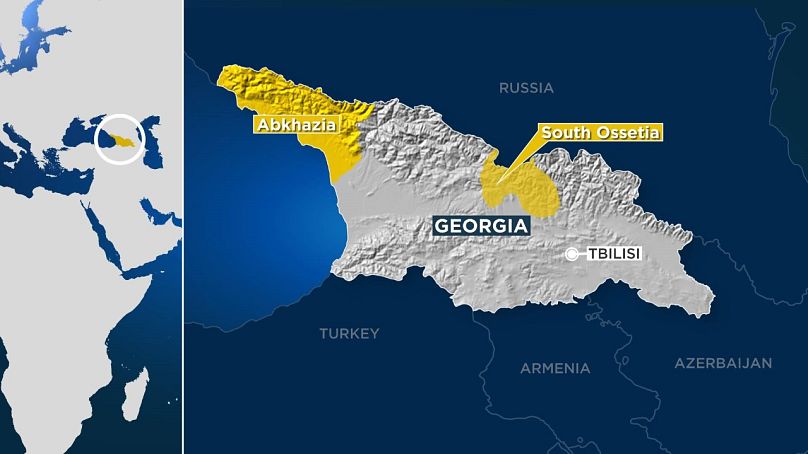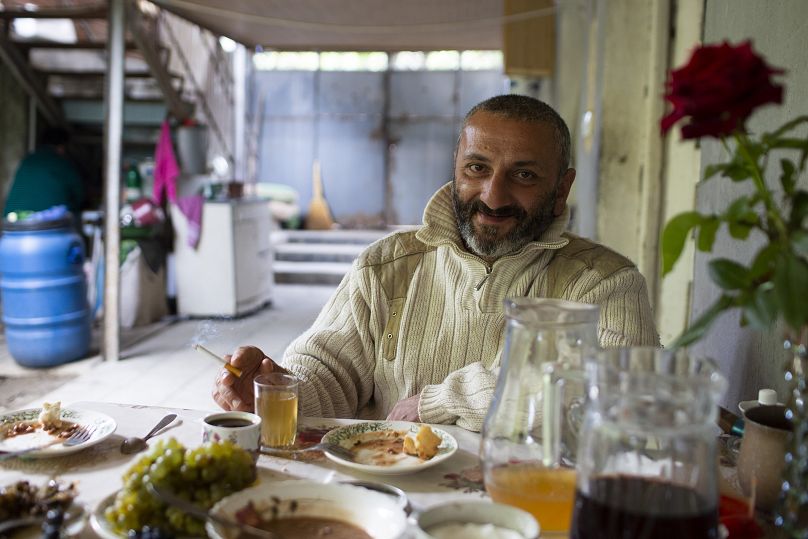Over a decade since the conflict with Russia, the prospects of re-unification appear to be slim.
From the garden of Sergei’s house, through the trees and across the river, it is a short walk to the city where he was born, the South Ossetian capital of Tskhinvali.
 ADVERTISEMENT
ADVERTISEMENT
 ADVERTISEMENT
ADVERTISEMENT
But for 13 years, Sergei has been able to make the journey to visit his many friends and family -- including his brother -- that still live in South Ossetia, once part of Georgia but now under Russian military control.
“I love Tskhinvali. I grew up there. I have friends there - 90 per cent of my friends were Ossetians,” he tells Euronews as he burns rubbish in a wheelbarrow outside his house in the village of Ergneti.
It is difficult for Sergei -- who declined to give his real name or be photographed -- to call his brother and because he is blacklisted by the authorities in South Ossetia, he can’t visit him either.
Close by, another elderly Georgian, who also declines to give his name as he walks through town carrying a bag of walnuts, looks over to Tskhinvali from the main road.
He doesn’t know who to blame, either the former government of Mikheil Saakashvili or Russia’s leader, Vladimir Putin.
“How can I explain it to you? It is dark business. On this side, there is Saakashvili, on the other side, Putin. I don’t want any of them,” he said.
The conflict between Russia and Georgia over the breakaway republics of South Ossetia and Abkhazia broke out in 2008. In just five days the Georgian army was routed by Russian forces, with around 1,000 mostly civilian casualties and as many as 190,000 people displaced.
It was an ugly conflict, with both sides accused of using so-called cluster munitions. Georgia has admitted using the deadly weapons -- although not against civilians -- but Russia has not. A ceasefire was agreed on August 17, 2008, and Russia withdrew from Georgia but not from the two breakaway regions.
South Ossetia and Abkhazia’s declarations of independence have only been recognised by six nations, Russia, Venezuela, Syria, Nicaragua, Nauru and Vanuatu. While Russia has said it wants a normalisation of relations with Georgia, Georgia says this is dependent on the breakaway regions being returned to its fold.
“From our point of view, Abkhazia and so-called South Ossetia is territory occupied by Russia where grave violations of human rights occur almost on a daily basis,” says Nikoloz Samkharadze, chairman of the Foreign Relations Committee of Georgia and a member of the ruling party Georgian Dream.
“Both regions are completely dependent on Russia security-wise, militarily, economically, and financially. Both regions are on the verge of annexation by Russia. It doesn’t really differ from the annexation of Crimea,” says Samkharadze referring to the Russian 2014 annexation of Crimea.
But in recent years talks between the two nations have stalled, and the borders between Georgia and the breakaway republics have been reinforced with kilometres of wire fencing. The border between Georgia and the two republics is closed, and the ABL has been fenced up with barbed wire.
The "return" of the territories to Georgia is one of the few things that the Georgian government and the opposition agree on, although there are different views on how to achieve it. In recent years, Tbilisi has focused on persuading the international community not to recognise the independence of the republics.
While Moscow may not be that interested in international law at the moment -- particularly with regard to territories it considers in its sphere of influence -- that may change in future, says Samkharadze.
“I think that international law will be very important for the Russian Federation. Even if they are not adhering to international law today, it doesn’t mean that they will not adhere to it tomorrow,” he said.
Meanwhile, Petre Tsiskarishvili of the United National Movement, the largest party in the opposition, which was founded by Saakashvili says the complete withdrawal of Russian troops is key.
“Russia needs to remove its troops from these regions and negotiations need to be brokered by a third party in Geneva. We will not agree that those two regions stay occupied or, even worse, get annexed like Crimea,” says Tsiskarishvili.
As for persuading South Ossetia and Abkhazia, it will be important to demonstrate to the authorities and the public in both regions that life will be easier as part of Georgia than as Russian proxies.
“It will not be achieved in weeks or months, but a long period with rapid economic growth, good education, health care, and a high standard of living,” Tsiskarishvili says.
Tinatin Khidasheli, former Georgian minister of defence and chair of Civic IDEA, agrees.
“People in the occupied areas are thinking about where they will work, where their kids will be going to university or school, and where they can get a secure life. Is the obvious choice Tbilisi?” he said.
“As long as Georgia is just as dangerous with limited possibilities, why then come and live here?”
Others point to disputed regions elsewhere in Europe that are at least manageable, even functional - if unresolved - such as Cyprus.
“The two sides do not recognise each other, but it is easy to cross. On the political level, there is conflict, but among people, there is not,” says Sergei Kapanadze, a board member of the organization Grass and a former deputy foreign minister of Georgia.
Stood in the garden of her home just north of Gori, Georgia, and just miles from South Ossetia (right?), Nana Figlishvili, 70, is nostalgic for the times when there were borders in this part of the Caucuses.
“Ossetians and Georgians used to live well. Like one big family,” said Figlishvili.
As it is, faced with hardship and frozen conflict, her children have moved away. Her son lives in Ukraine, where he works as a doctor. Her daughter is working in Italy.
“Life is hard here. The pension is 300 lari (€83), and it is not enough for light and gas. Medicine is also expensive. It is really hard to live here without a son,” she said.
It is a common story. Tomas, 45, and his mother Gulnara, 76, said around 200 people now live in the village, far fewer than before the war.
“Now no one wants to live here. I was living and working in Europe for 14 years. In Austria, Germany, and then Italy. There is no work here, so I went there to work. But my family is here, so I returned,” he said.
Tomas has family in South Ossetia - a cousin and an uncle - who he never sees them.
Further down the street, 58-year-old Leila is standing at the gate to her garden on a small stone road. Over her and the garden hangs ripe grapes. It is wine harvest season.
Though the harvest looks promising this year, Leila holds no hope for the future.
“In the war, everything was terrible, terrible, but now it is also awful. There is no war but it's hard to live. I do not know if it will be better. In my opinion, it won’t,” she said.
“If there was work. If we had money, maybe. But you have to eat. You have to live. Medicine is expensive, and thank God, I don’t need it, but others do.”
Every weekday, Uncovering Europe brings you a European story that goes beyond the headlines. Download the Euronews app to get a daily alert for this and other breaking news notifications. It's available on Apple and Android devices.












